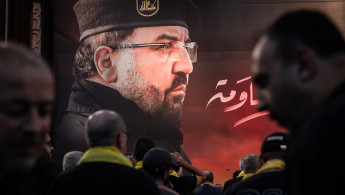Hezbollah denies reports phone call lured Fuad Shukr to location to be killed
Lebanese group Hezbollah has denied a report from the Wall Street Journal (WSJ) which stated that the group’s senior military commander was lured by a phone call to go the seventh floor of the building where he lived, before he was killed by Israeli munitions.
WSJ reported the call likely came from someone who had breached Hezbollah’s internal communications network.
Hezbollah hit out at the claim on Sunday, calling it "fabricated" in a Telegram statement.
The group added the report was "full of lies", adding "none of the three newspaper correspondents who put their names on the aforementioned article have ever met any Hezbollah officials at all."
"Therefore, the false story from its foundation and the source attributed to it are nothing more than the imagination of its writers," the statement continued.
WSJ also reported that a Hezbollah official told them both Hezbollah and Iran are still investigating what happened, but believe Israel beat their countersurveillance with better technology and hacking.
Hezbollah said such report was aimed at spreading Israeli propaganda "in the service of the Zionist project".
Shukr was killed on 30 July in the southern Beirut neighbourhood of Dahiyeh, with Hezbollah leader Hassan Nasrallah saying that he had been in touch with him just a few hours before he was killed.
Shukr was considered one of the most important figures in Hezbollah and is believed to have been commanding the group’s cross-border exchange of fire with Israel since the start of Israel’s war on Gaza on 7 October.
The killing of Shukr served as a huge blow to the group as he was one of their most senior operatives and founders. It came around the same time frame of the killing of Hamas’ political bureau chief Ismail Haniyeh in Tehran.
Shukr also had a leading role in 1982, when he helped organise Shia fighters in Beirut to oppose Israel’s invasion of Lebanon during its civil war.
Israel said it killed Shukr, 61, in retaliation for a July 27 rocket attack that killed 12 children aged between 10 and 16 in the Druze village of Majdal Shams in the Israeli-occupied Golan Heights.
However, Hezbollah said it was not responsible for the attack, and pointed the finger at Israel.
His killing has sparked fears of a wider escalation in conflict in the region, with both Hezbollah and Iran vowing retaliation against Israel.




 Follow the Middle East's top stories in English at The New Arab on Google News
Follow the Middle East's top stories in English at The New Arab on Google News

![A group of Palestinians, foreign and Israeli activists gather to participated in an olive picking event on the land in the town of Battir, which is under threat of confiscation by Israel in Bethlehem, occupied West Bank on 8 November 2024. [Getty]](/sites/default/files/styles/image_330x185/public/2182930803.jpeg?h=199d8c1f&itok=__0LgGsa)
